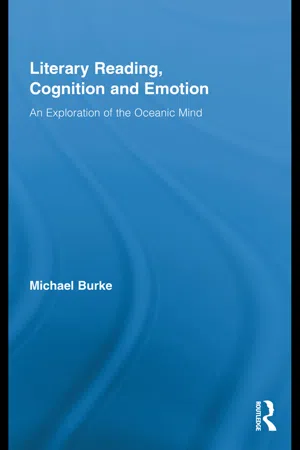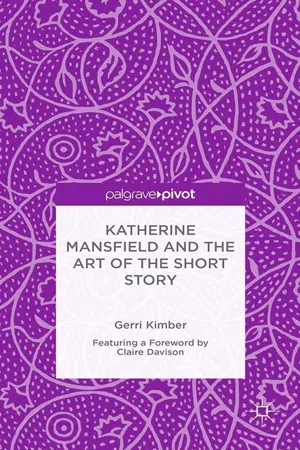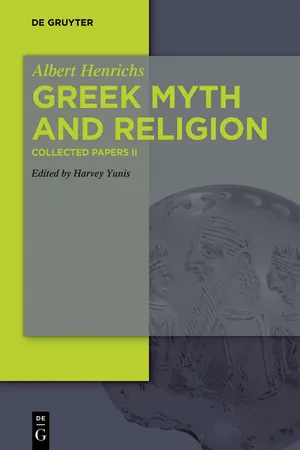Epiphany
An epiphany in literature refers to a moment of sudden insight or realization experienced by a character. It often leads to a significant change in the character's understanding or perspective. Epiphanies can be pivotal in driving the plot forward and are commonly used to reveal deeper truths about the characters or the story's themes.
5 Key excerpts on "Epiphany"
- Rust Hills(Author)
- 2000(Publication Date)
- Mariner Books(Publisher)
...“Epiphany” as a Literary Term There are many other terms too, besides all these, and perhaps anyway they don’t all refer to the same thing. A good deal of the trouble with a lot of the terms in which short stories are discussed is that they come to us originally from drama theory or from the formulas of slick fiction. One term, however, that we have not hitherto mentioned is particularly appropriate to the modern short story and its subtle effects. It is “Epiphany,” a word that James Joyce used in special, but confusing ways. Epiphany-with-a-capital-E refers now to the twelfth day after Christmas; its eve is Twelfth Night. Twelve days after Jesus was born in Bethlehem, the Magi (the three wise men) saw Him there: He was manifested or shown to them as king of the Gentiles. The feast or festival of the Epiphany also commemorates two other events in the life of Christ: his baptism by John, when his sonship to God was made manifest to the world; and the miracle at Cana, when he turned water to wine at a wedding and first manifested his divine powers. The word is from the Greek epiphaneia, meaning “appearance,” derived from epi, meaning “to,” plus phaineim, meaning “show.” Thus: “to show to.” And “Epiphany”—now without a capital E—means any such luminous, divine manifestation. De Quincey, for instance, spoke of the “epiphanies of the Greek intellect.” The Joycean concept of the Epiphany is even more secu lar. In 1900, when James Joyce was eighteen or thereabouts, he had not had much luck publishing his poetry, so he started writing carefully wrought little pieces of nonpoetry, which he called “epiphanies.” Stephen Hero, the manuscript of Joyce’s discarded version of the autobiographical novel of his youth in Dublin that was entirely rewritten as Portrait of the Artist as a Young Man, describes how Joyce may have begun to record his epiphanies...
- eBook - ePub
How To Read A Poem
And Fall in Love with Poetry
- Edward Hirsch(Author)
- 1999(Publication Date)
- Ecco(Publisher)
...B. Yeats calls “a new knowledge of reality.” The epiphanic moment always marks a crisis point in a work, a threshold experience. One notices how often, and how primitively, it is set off by the word suddenly. It is a moment of illumination that signals a dramatic turning point for the protagonist. The change is interiorized; under the pressure of insight one’s mental landscape is irrevocably altered. Such moments are “visionary”; that is, they mark a crossover from one level of experience to another. There is a twofold risk or danger in trying to incorporate or contain the transcendental experience in writing. Since the Epiphany is by definition triggered by an ordinary experience, one danger is that the writer will communicate the ordinariness and not the Epiphany, thus getting stuck in concrete particulars, in an untransformed matter-of-factness. The other risk is that the ordinary experience will trigger what seems an inordinate or melodramatic response, what Keats calls “the egotistical manufacture of metaphysical importance upon trivial themes.” Epiphanic experiences exist outside ordinary time. They are atemporal. The consequences of such visionary experiences for time-bound narratives are profound. Most poems, for example, have both narrative and lyrical values: the impulse to tell a story, the impulse to sing. These impulses are not necessarily in harmony with each other. The point of narrative is to strengthen the bonds of consequence, the course of narrative is movement. Momentum is life itself since its goal is always to continue, to carry on, to create an unceasing flow of events. It is all motion and accretion. That is why E. M. Forster called narrative “the lowest and simplest of literary organisms.” The goal of the lyric, on the other hand, is often to dramatize intense states of feeling...
- eBook - ePub
Literary Reading, Cognition and Emotion
An Exploration of the Oceanic Mind
- Michael Burke(Author)
- 2010(Publication Date)
- Routledge(Publisher)
...First, in its biblical sense it refers to a Christian feast day, 6 January, which commemorates the manifestation of the newborn Christ to the three Magi. The etymological root of the word means “showing” or more figuratively “bringing to light”. The notion of vision is thus paramount. Moreover, there is a clear classical precursor in the Greek term epiphaneia, which was a recurring event involving the ancient gods swooping down from their mountain domains to appear before mortal men and women. In this sense, although the focus is still on “showing”, as seen in the etymology of the word, there is movement and apparition involved. In the literary, character-based notion of the word, Epiphany involves a sudden manifestation or perception of the essence or meaning of something. This is the sense of the term most frequently used in mainstream twentieth-century literary scholarship to refer to heightened character emotion. The most-cited example from English literature takes place in James Joyce’s A Portrait of the Artist as a Young Man (1914–15/1992) and concerns the protagonist Stephen Dedalus’s revelation while watching a young girl wade in the ocean surf (1992: 185–86). An equally famous yet much earlier episode is William Wordsworth’s reference to “spots of time” in his Prelude (1799: II. 258). Such character epiphanies are usually triggered by a seemingly trivial incident that is often linked in some way to childhood or the memory of childhood locations. Attempts have been made in the last thirty years to theorise Epiphany. For instance, Morris Beja introduced the two terms “incongruity” and “insignificance” in the early 1970s. The first of the essentially philosophical terms indicates that an Epiphany is irrelevant to the object or incident that triggers it. The second term suggests that an Epiphany is triggered by a trivial object or incident (1971: 16–17)...
- Gerri Kimber(Author)
- 2014(Publication Date)
- Palgrave Pivot(Publisher)
...This aspect of aesthetic theory is elaborated by James Joyce at considerable length, though it has come to extend beyond the Joycean definition as presented in Stephen Hero. Stephen’s Epiphany is characterised by the recognition of the significance of a ‘trivial’ incident and the emphasis on the spiritual nature of the experience. (p. 80) 2 Gerri Kimber and Angela Smith, eds, The Poetry and Critical Writings of Katherine Mansfield (Edinburgh: Edinburgh University Press, 2014), p. 550. Review of Heritage by V. Sackville West, titled ‘A Novel Without a Crisis’. Gunsteren perceives a Hegelian ideality in this notion: The Epiphany can be seen as a ‘moment of truth’ in the character’s mind, as described in the text as a brief moment of experience. The ‘moment of truth’, whether experienced by a fictional character or as a spontaneous ‘gift’ in life, had considerable weight for Mansfield. The philosophy of Hegel underlies the intuition of harmony within dissonance characteristically assigned to such epiphanic moments. Mansfield had read Hegel at Queen’s College, as an early notebook reference shows, and her notes on Vaihinger also indicate familiarity with Hegel’s thinking. The Hegelian ideality, when reconciling warring opposites, recurs as one of the themes in letters and journals, with varying degrees of emphasis on (sensory) apperception’. (p. 81) 3 O’Sullivan in Pilditch, p. 142. 4 Mansfield used the word ‘blissful’ in the following letter, talking of the epiphanic moment: God forbid that another should ever live the life I have known here and yet there are moments you know, old Boy, when after a dark day there comes a sunset – such a glowing gorgeous marvellous sky that one forgets all in the beauty of it – these are the moments when I am really writing – Whatever happens I have had these blissful, perfect moments and they are worth living for’. (Letters, 3, p. 176 [c.12 January, 1920]) 5 Wheeler, p. 122. 6 O’Sullivan in Pilditch, p. 143. 7 Head, p. 110....
- eBook - ePub
- Albert Henrichs, Harvey Yunis, Harvey Yunis(Authors)
- 2019(Publication Date)
- De Gruyter(Publisher)
...152. “I was spared appendicitis until I was fifty and could make an epiphanic short story out of it.” For our purposes we need not concern ourselves with the application of the term “epiphanic” to creative writing and to moments of intellectual insight, inspiration, or personal self-realization. But one cannot help being sympathetic to John Updike, who turned appendicitis at the age of fifty into “an epiphanic short story,” as he calls it, or wishing for one’s own work to experience some of the “epiphanic moments” that intrigued Northrop Frye in 1951. I do not know who coined the felicitous phrase “epiphanic moment,” which is wildly popular in criticism, but I have gratefully adopted it. In doing so I intend to restore its underlying religious meaning by defining it as that moment in the epiphanic process when something clicks, when sight turns into insight and when the human witness recognizes that he or she is in the presence of a divinity. What strikes me most about these lexical entries, however, is how closely the general definitions under (a) and (b) resemble one another – compare the phrase “a manifestation or appearance of some divine being” in (b) with “the manifestation of Christ to the Gentiles” in (a). I take that convergence as a reflection of the degree to which the two spheres, the non-Christian and the Christian, have become conflated as far as modern conceptions of Epiphany are concerned. In both entries, the emphasis throughout is on divine manifestation, on commemoration, and on festival. More significantly, the comparison shows that modern definitions of both Christian and pagan Epiphany tend to privilege the revealing divinity over the human agent who receives and witnesses the revelation. The reason for this unilateral approach has nothing to do with the Greek texts, which are as interested in the human recipients of the revelation as they are in the self-revealing divinities themselves...




